Charles de Lint
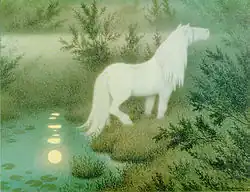
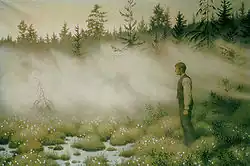
Charles de Lint (born 22 December 1951) is a Canadian fantasy author and Celtic folk musician.
Quotes

- When all's said and done, all roads lead to the same end. So it's not so much which road you take, as how you take it.
- Greenmantle (1998). p. 322
- If you're not ready to die, then how can you live?
- Svaha (2000), p. 265
- I'm not Chinese. I thrive in interesting times.
- Someplace to be Flying (2005), p. 130
- The problem with children is that you have to put up with their parents.
- As quoted in The Ultimate Guide to Celebrating Kids : K-6th Grade School (2005) by Linda LaTourelle, p. 134
Short fiction
- I was going through the motions of life, instead of really living, and there’s no excuse for that. It’s not something I’ll let happen to me again.
- Making a Noise in This World in Hartwell (ed.) Year's Best Fantasy (2001), p. 326
Dreams Underfoot (1993)
- Page numbers from the first mass market paperback edition, published by Tor in July 1994, ISBN 0-812-51621-4, first printing
- See Charles de Lint's Internet Science Fiction Database page for original publication details
- Italics as in the book
- “He can be so sweet on one page, and then on the next he’s taking you on a tour through an abattoir.”
“Just like life,” Bramley said.- The Stone Drum (p. 36)
- Blasting out of the stores speakers was the new Beastie Boys album. It sounded like a cross between heavy metal and bad rap and was about as appealing as being hit by a car. You couldn’t deny its energy, though.
- Timeskip (p. 64)
- “Don’t you ever watch TV?”
Jilly shook her head. “What? And let the aliens monitor my brain waves?”- Freewheeling (p. 82)
- The best kinds of practical jokes are those a bit backfire on whoever’s playing the trick.
- That Explains Poland (p. 113)
- The road leading to a goal does not separate you from the destination; it is essentially a part of it.
- Romano Drom (p. 118; credited as a Romany saying)
- “I’d rather stare at a brick wall, any time, than watch that damn TV in the lounge,” he’d told Jilly more than once. “That’s when things started to go wrong—with the invention of television. Wasn’t till then that we found out there was so much wrong in the world.”
- Winter Was Hard (pp. 159-160)
- Jilly was one of those who preferred to know what was going on and try to do something about it, rather than pretend it wasn’t happening and hoping that, by ignoring what was wrong, it would just go away. Truth was, Jilly had long ago learned, trouble never went away. It just got worse—unless you fixed it.
- Winter Was Hard (p. 160)
- But music has its own enchantment and the first few notes of an old tune are all that it requires to transform any site into a place of magic, even if that location is no more than a windowless office cubicle in the old Firehall’s basement.
- Ghosts of Wind and Shadow (p. 188)
- In one form or another, it was one of the first implements created by ancient people to give voice to the mysteries that words cannot encompass, but that they had a need to express; only the drum was older.
- Ghosts of Wind and Shadow (p. 188)
- That's the thing with magic. You've got to know it's still here, all around us, or it just stays invisible for you.
- Ghosts of Wind and Shadow (p. 193)
- “There’s stories and then there’s stories,” he said, interrupting her. “The ones with any worth change your life forever, perhaps only in a small way, but once you’ve heard them, they are forever a part of you. You nurture them and pass them on, and the giving only makes you feel better.
“The others are just words on a page.”- The Conjure Man (p. 230)
- “Who is he?” she asked. “Or maybe I should be asking what is he?”
“I’ve always thought of him as a kind of anima, Jilly said. “A loose bit of myth that got left behind when all the others went on to wherever it is that myths go when we don’t believe in them anymore.”- The Conjure Man (p. 235)
- It’s so much easier for most people to relate to a TV set than it is to another person. They get all this data fed into them, but they don’t know what to do with it anymore. When they talk to other people, it’s all surface. How ya doing, what about the weather. The only opinions they have are those that they’ve gotten from people on the TV. They think they’re informed, but all they’re doing is repeating the views of talk show hosts and news commentators.
- The Conjure Man (p. 236)
- They’d met three years ago at a record launch party when Hilary had made a pass at her. Once they got past the fact that Zoe preferred men and wasn’t planning on changing that preference, they discovered that they had far too much in common not to be good friends.
- Small Deaths (p. 252)
- Creeps don’t need reasons for what they do; that’s why they’re creeps.
- Small Deaths (p. 252)
- Do you know what fear stands for? Fuck Everything And Run.
- Small Deaths (p. 257)
- She’s always so ready to believe anything that anyone tells her, so long as it’s magical.
Well, I believe in magic, too, but it’s the magic that can turn a caterpillar into a butterfly, the natural wonder and beauty of the world that’s all around me. I can’t believe in some dreamland being real.- The Moon Is Drowning While I Sleep (p. 289)
- I find that a lot of people have this thing about making crap romantic, the way they like to blur outlaws and heroes, the good with the bad.
- But for the Grace Go I (p. 322)
- I know that feeling all too well, but I broke the only pair of rose-colored glasses I had the chance to own a long time ago.
- But for the Grace Go I (p. 322)
- Every big city like this is really two worlds. You could say it’s divided up between the haves and the have-nots, but it’s not that simple. It’s more like some people are citizens of the day and others of the night. Someone like me belongs to the night. Not because I’m bad, but because I’m invisible. People don’t know I exist.
- But for the Grace Go I (p. 326)
- It was the old story, he realized. Everything, everybody wanted to lay claim to a piece of your soul. And if they couldn’t have it, they made you pay for it in guilt.
- Our Lady of the Harbour (p. 381)
- Look, I’m sorry if I don’t measure up to how people want me to be, but this is just the way I am.
- Our Lady of the Harbour (p. 394)
- Those who live forever, who have no stake in the dance of death’s inevitable approach, can never understand the sanctity of life.
- Our Lady of the Harbour (p. 399)
- Time does more than erode a riverbank or wear mountains down into tired hills. It takes the edge from our memories as well, overlaying everything with a soft focus so that it all blurs together. What really happened gets all jumbled up with the hopes and dreams we once had and what we wish had really happened.
- Paperjack (p. 416)
- Everybody makes the same mistake. Fortune-telling doesn’t reveal the future; it mirrors the present. It resonates against what your subconscious already knows and hauls it up out of the darkness so that you can get a good look at it.
- Paperjack (p. 438)
- It’s the questions we ask, the journey we take to get to where we are going that’s more important than the actual answer. It’s good to have mysteries. It reminds us that there’s more to the world than just making do and having a bit of fun.
- Paperjack (p. 439)
- She calls herself Tallulah, but I know who she really is. A name can’t begin to encompass the sum of all her parts. But that’s the magic of names, isn’t it? That the complex, contradictory individuals we are can be called up complete and whole in another mind through the simple sorcery of a name.
- Tallulah (p. 440)
- As far as I’m concerned, the only difference between fact and what most people call fiction is about fifteen pages in the dictionary.
- Tallulah (p. 441)
- There are three kinds of kids: the ones that are the odd birds, the ones that pissed on them, and the ones that watched it happen.
- Tallulah (p. 444)
Moonheart (1984)
- All page numbers are from the trade paperback edition published by Orb, ISBN 978-0-312-89004-9, (1994), 15th printing
- Italics and ellipses as in the book
- That was the trouble with not paying attention to money. It was never there when you needed it.
- Part 1, Chapter 3 (p. 41)
- And just because she and her uncle were loaded, that didn’t automatically make them useless as human beings.
- Part 2, Chapter 1 (p. 119)
- “Sometimes it feels like we’re living in the middle of a comic book. You know what I mean?”
“All too well.”
“Thing I always ask,” Tucker said, “is where’s Superman when you need him?”- Part 2, Chapter 5 (p. 222)
- While he was out of the room, Tucker sauntered over to the worktable and had a look at the poetry. He read a line here and there, but couldn’t make a lot of sense out of any of it. That was the trouble with poems. It seemed you had to have a doctorate just to understand the references. Still. Some of it had a nice ring to it.
…like Manjushri, I have met death,
and bear my own victory,
though not a sword…
Nice. Yeah. If you knew what the hell it meant.- Part 2, Chapter 5 (p. 224)
- Watching him, Sara knew that what he said was ninety percent bravado. Still there was nothing wrong with that. Bravery was in knowing the odds and still going against them.
- Part 3, Chapter 5 (p. 354)
- Remember the quiet wonders. The world has more need of them than it has for warriors. And this I will tell you as well: One cannot seek to uphold honor in a being that has none.
- Part 3, Chapter 7 (p. 386)
- “What in God’s name….”
“I don’t know ’bout you,” Wilson said, “but I don’t think God’s got a whole lot to do with this place.”- Part 4, Chapter 2 (p. 410)
Yarrow: An Autumn Tale (1986)
- All page numbers are from the trade paperback edition published by Orb, ISBN 0-312-86393-4, in December 1997, 1st printing
- There are few joys to compare with the telling of a well-told tale.
- Chapter 5, “That Night” (p. 43)
- But while the tale itself, its truth, is of the utmost importance, it is the telling that allows it to be remembered or forgotten. The trueness of the telling is what makes up a storyteller’s craft.
- Chapter 5, “That Night” (p. 44)
- There's enough weirdness in the world as it is without having to give it supernatural trappings, don't you think?
- Chapter 13, “The Hounds are Loosed” (p. 208)
The Little Country (1991)
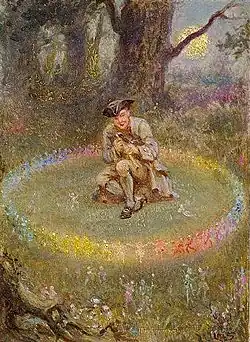
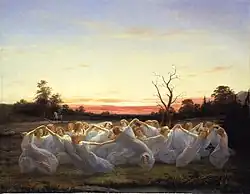
- The Lost Music was his way of talking about the way he believed that old wives' tales and dance tunes and folktales were just the tangled echoes of something that's not quite of this world … something we all knew once, but have forgotten since.
- Part One: The Hidden People, "The Quarrlsome Piper" p. 19
- A body of work may be reviled — mostly by those who have no knowledge of its workings — and yet still carry elements of what can only be considered eternal truths.
- Part One: The Hidden People, "Border Spirit" p. 334
- It's not the work or the personality of the founder of a religion that's important, but what its followers do with what they learn...
- Part One: The Hidden People, "Border Spirit" p. 335
- I love this world … That is what rules my life. When I die, I want to have done all in my power to leave it in a better state than it was in when I found it. At the same time I know that this can never be. The world has grown so complex that one voice can do little to alter it any longer. That doesn't stop me from doing what I can but it makes the task hard. The successes are so small, the failures so large and many. It's like trying to stem a storm with one's bare hands.
- Goninan in Part One: The Hidden People, "Border Spirit" p. 336
- It may sound trite, but using the weapons of the enemy, no matter how good one's intentions, makes one the enemy.
- Goninan in Part One: The Hidden People, "Border Spirit" p. 336
- Legend and myth are what we use to describe what we don't comprehend. They are out attempts to make the impossible, possible — at least insofar as our spirits interact with the spirit of the world, or if that is too animistic for you, then let's use Jung's terminology and call it our racial subconscious. No matter the semantics, they are of a kind and it is legend and myth that binds us all together. … Through them, through their retellings, and through those version that are called religion while they are current, we are taught Truth and we attempt to understand Mystery.
- Goninan in Part One: The Hidden People, "Border Spirit" p. 336
- Like legend and myth, magic fades when it is unused — hence all the old tales of elfin Kingdoms moving further and further away from our world, or that magical beings require our faith, our belief in their existence, to survive. … That is a lie. All they require is our recognition.
- Goninan in Part One: The Hidden People, "Border Spirit" p. 337
- Why did men worship in churches, locking themselves away in the dark, when the world lay beyond its doors in all its real glory?
- Part Two: The Lost Music, "The Touchstone" p. 501
- They stood and listened, arms around each other for comfort, as the sound washed over them. It reverberated in the marrow of their bones, sung high and sweet, heartbreakingly mournful, quick as a jig, slow as the saddest air. Their hearts swelled with its beauty, its mystery. With all it revealed, and all that it hid.
- Part Two: The Lost Music, "The Touchstone" p. 507
Into the Green (1993)

Presences...
- While you live … you have a duty to life. … The fey wonders of the world only exist while there are those with the sight to see them. … Otherwise they fade away.
- p. 26; This has also been misquoted as "The few wonders of the world only exist while there are those with the sight to see them."
- Witchery is merely a word for what we are all capable of — heightened nightsight, an empathy shared with the beasts, a utilization of the more obscure abilities of our minds. Nothing that science can't explain away. Wizardry is spells and enchantments. Fairy tales.
- Lammond in Ch. 36 p. 227
- He had seen trances before — wise men far in the east, who could feign death; a herbwife as she bent over her patient, searching for invisible hurts.
But this was different. He could sense something here, within the circle cast by the light of the fire. A presence.
Presences...- Ch. 36 p. 233
Memory and Dream (1994)
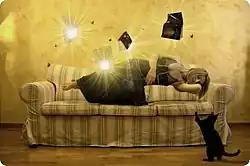
- One expected growth, change; without it, the world was less, the well of inspiration dried up, the muses fled.
- "Footprints in the Dust", p. 19
- I think you're all mad. But that's part and parcel of being an artistic genius, isn't it?
- "Baiting the Hook", p. 42
- I've always believed the lies we use to make our fictions reveal the truth with far more honesty than any history or herstory or life story.
- "Journal Entries", p. 118
- I've always had these bouts of depression; I hide them well but doesn't mean they aren't there. … I didn't have anyone around for whom I had to put on a cheerful mask. The thing with pretending you're in a good mood is that sometimes you can actually trick yourself into feeling better.
- "Journal Entries", p. 186
- I don't know why I care what people write about me after I'm dead, except that since I invest so much of my time telling the truth in my fiction, I'd hate to see someone play fast and loose with the pieces of my life. I don't care what they might think of me; but I don't want lies about my life used to invalidate the stories. My characters seem real because they are drawn from the realities of my life. I didn't have to research their pain; I just tapped into my own.
- "Journal Entries", p. 188
The Ivory and the Horn (1996)
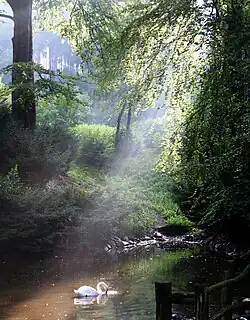
- All page numbers from the mass market edition published by Tor Books
- “Often,” he says, “what we take from the spirit world is only a reflection of what lies inside ourselves.”
- “Waifs and Strays”, p. 25
- The real problem is, people think life is a ladder, and it’s really a wheel.
- “The Forest is Crying”, p. 44 (quoting Pat Cadigan)
- Wisdom never comes to those who believe they have nothing left to learn.
- “The Forest is Crying”, p. 62
- What I’ve got to talk about, I don’t think a priest wants to hear. What does a priest know or care about secular concerns? All they want to talk about is God. All they want to hear is a tidy list of sins so that they can prescribe their penances and get on to the next customer.
- “The Wishing Well”, p. 74
- There are people who take the heart out of you, and there are people who put it back.
- “Dead Man’s Shoes”, p. 143, quoting Elizabeth David
- I had the same questions for Superman as I did for God: If he was so powerful, why didn’t he deal with some real problems? Why didn’t he stop wars, feed the starving in Ethiopia, cure cancer? At least God had the Church to do His PR work for Him — if you can buy their reasoning, they have any number of explanations ranging from how the troubles of this life build character to that inarguable catchall, “God’s will.” And the crap in this life sure makes heaven look good.
When I was growing up, the writers and artists of Superman never even tried to deal with the problem. And since they didn’t, I could only see Superman as a monster, not a hero. I couldn’t believe his battles with criminals, superpowered geniuses and the like.
I never believed in God either.- “Bird Bones and Wood Ash”, p. 169
- Our time’s the most precious thing we’ve got to offer folks, and the worst thing a body can do is to take it away from us.
- “Saxophone Joe and the Woman in Black”, p. 212
- That dichotomy between who she was and who she thought she should be was what really killed her.
- “Pal o’ Mine”, p. 244
- When you’re invisible, no one can see that you’re different.
- “Pal o’ Mine”, p. 244
- You can talk all you want about consensual reality, Jilly, but that doesn’t change the fact that some things are real and some things aren’t. There’s a line drawn between the two that separates reality from fantasy.
- “Where Desert Spirits Crowd the Night”, p. 253
- A long time ago a bunch of people reached a general consensus as to what’s real and what’s not and most of us have been going along with it ever since.
- "Where Desert Spirits Crowd the Night", p. 254
- Only fools think they’re wise; the rest of us just muddle through as we can.
- “Where Desert Spirits Crowd the Night”, p. 264
- “You’re confusing me.”
“But not deliberately so,” Coyote says. “Let it go on record that any confusion arose simply because we lacked certain commonalities of reference.”- “Where Desert Spirits Crowd the Night”, p. 265
- You’re not a nun, are you? You haven’t taken one of those absurd vows that cut you off from what otherwise might be a full and healthy human existence?
- “Where Desert Spirits Crowd the Night”, p. 267
- The thing is … nothing’s as easy as we'd like it to be. … And the real trouble comes from not knowing what we really want in the first place.
- "Where Desert Spirits Crowd the Night", p. 282
- Without mysteries, life would be very dull indeed. What would be left to strive for if everything were known?
- "Where Desert Spirits Crowd the Night", p. 289
- “Compromise is necessary,” Max agreed, “so long as you never give up who you are. That isn’t compromise; that’s spiritual death. You have to remain true to yourself.”
- “Where Desert Spirits Crowd the Night”, p. 291
- The best artists know what to leave out. They know how much of the support should show through as the pigment is applied, what details aren't necessary.
- "Dream Harder, Dream True", p. 293
- By enlarging your knowledge of things, you will find your knowledge of self is enlarged.
- “The Pochade Box”, p. 318
- Life’s like art. You have to work hard to keep it simple and still have meaning.
- “The Pochade Box”, p. 318
- If you understand, things are just as they are. If you do not understand, things are just as they are.
- “The Forever Trees”, p. 327 (quoting a Zen saying)
- Nothing’s different, but everything has changed.
- “The Forever Trees”, p. 331